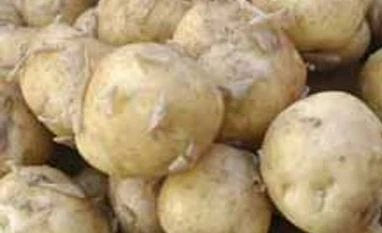The Union government’s decision to douse the rising price of potato through imports has run into an unexpected block.
Nafed, formally the National Agricultural Cooperative Marketing Federation of India Ltd, was told to invite import bids. Formally, it is registered as a farmers’ cooperative, though it is also an arm of the government, under the ministry of agriculture. And, its head has questioned the import order.
“We are a market intervention body. We procure agri commodities at the Minimum Support Price on the ministry’s direction, when the price slips below the minimum threshold. We procured a huge quantity of agri commodities in the past, for which the government has held around Rs 400 crore of dues for several years. Let the government first clear our dues before we commence another operation,” said V R Patel, chairman of Nafed.
Adding: “We do not have enough funds to pay employees’ salary. Where shall we arrange funds from, to import potatoes for the government?”
Potato prices have risen 23 per cent in a little less than two months on reports of rainfall shortage leading to less output. In the benchmark, Burdwan (West Bengal) wholesale market, it sold at Rs 1,750 a quintal on Monday, compared to Rs 1,480 a qtl on August 1.
West Bengal produces a little over a fourth of India’s annual crop of 46 million tonnes. And, the state government has restricted its transport outside Bengal. As a result, prices are still higher elsewhere. In Mumbai, for example, it was Rs 2,050 a qtl on Monday, from Rs 1,950 a qtl on September 1.
On Friday, Union agriculture minister Radha Mohan Singh had announced a decision to import. After which, Ashish Bahuguna, the ministry’s secretary said Nafed had been told to begin preparations for floating a tender.
Also, say traders, the price of potatoes in the international market is higher than in India. China is the world’s largest producer at 120 mt of annual output.
According to R P Gupta, Director, National Horticultural Research and Development Foundation, sowing for the coming season’s crop had been progressing well. Both the area under cultivation and the output are expected to surpass last year’s 46 mt.
Nafed, formally the National Agricultural Cooperative Marketing Federation of India Ltd, was told to invite import bids. Formally, it is registered as a farmers’ cooperative, though it is also an arm of the government, under the ministry of agriculture. And, its head has questioned the import order.
“We are a market intervention body. We procure agri commodities at the Minimum Support Price on the ministry’s direction, when the price slips below the minimum threshold. We procured a huge quantity of agri commodities in the past, for which the government has held around Rs 400 crore of dues for several years. Let the government first clear our dues before we commence another operation,” said V R Patel, chairman of Nafed.
Adding: “We do not have enough funds to pay employees’ salary. Where shall we arrange funds from, to import potatoes for the government?”
Potato prices have risen 23 per cent in a little less than two months on reports of rainfall shortage leading to less output. In the benchmark, Burdwan (West Bengal) wholesale market, it sold at Rs 1,750 a quintal on Monday, compared to Rs 1,480 a qtl on August 1.
West Bengal produces a little over a fourth of India’s annual crop of 46 million tonnes. And, the state government has restricted its transport outside Bengal. As a result, prices are still higher elsewhere. In Mumbai, for example, it was Rs 2,050 a qtl on Monday, from Rs 1,950 a qtl on September 1.
On Friday, Union agriculture minister Radha Mohan Singh had announced a decision to import. After which, Ashish Bahuguna, the ministry’s secretary said Nafed had been told to begin preparations for floating a tender.
Also, say traders, the price of potatoes in the international market is higher than in India. China is the world’s largest producer at 120 mt of annual output.
According to R P Gupta, Director, National Horticultural Research and Development Foundation, sowing for the coming season’s crop had been progressing well. Both the area under cultivation and the output are expected to surpass last year’s 46 mt.
)